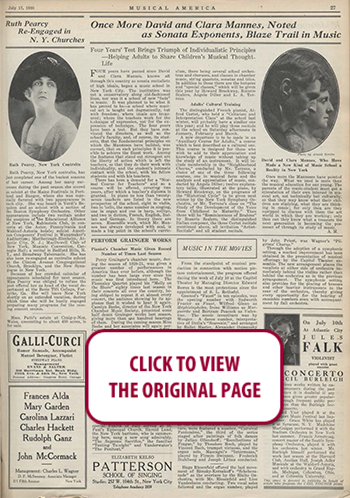 100 YEARS AGO IN MUSICAL AMERICA (346)
100 YEARS AGO IN MUSICAL AMERICA (346)
July 17, 1920
Page 27
Once More David and Clara Mannes, Noted as Sonata Exponents, Blaze Trail in Music
Four Years’ Test Brings Triumph of Individualistic Principles—Helping Adults to Share Children’s Musical Thought-Life
FOUR years have passed since David and Clara Mannes, known all through this country as sonata recitalists of high ideals, began a music school in New York City. The institution was not a conservatory along old-fashioned lines, nor was it a school of new “fads” in music. It was planned to be what it has proved to be—a school where musical art is taught, not dogmatically, but with freedom; where ideals are treasured; where the teachers work for the technique of expression, not for the expression of technique. The four years have been a test. But they have convinced the directors, as well as the school’s faculty, and, of course, its students, that the fundamental principles on which the Manneses have built, was correct, that on such principles it is possible to achieve the finest work. Among the features that stand out strongest are the liberty of action which is left the teachers, so that they do their work with individuality, and the student’s intimate contact with the school, with his fellow students and with his teachers.
There has been a demand for a “Normal Course for Teachers” and so a course will be offered, covering two years, after which a teacher’s diploma is granted. In piano no less than twenty-seven teachers are listed in the new prospectus of the school, eight in violin, two in ‘cello, thes same number in singing, one in organ and one in harp, solfège, and two in diction, French, English, Italian and German. In theory there are seven. Ensemb1e work, which Mr. Mannes has always developed with zeal, is made a big point in the school’s curriculum, there being several school orchestras und choruses, and classes in chamber music, string quartets, sonatas and trios. ln addition to these there are the lectures and ‘“special classes,” which will be given this year by Howard Brockway. Rosario Scalero, Angela Diller and L A. Torrens.
Adults’ Cultural Training
The distinguished French pianist, Alfred Cortot, who held a “Criticism and Interpretation Class at the school last winter, will probably have a similar one this year; and he will play three recitals at the school on Saturday afternoons in January, February and March.
A new departure is to be made in an “Auxiliary Course for Adults,” a course which is best described as a cultural one. This course is designed for those who wish to add to their appreciation and knowledge of music without taking up the study of an instrument. It will include membership in the “Neighborhood Chorus,” conducted by Mr. Torrens, a choice of one of the three fol1owing courses, one in musical form and the analysis and appreciation of music, conducted by Angela Diller; twelve explanatory talks, illustrated at the piano, by Howard Brockway, on the programs of the “Historical Cycle” to be given next winter by the New York Symphony Orchestra, or Mr. Torrens’s class on “The Study of the Development of the Voice from Childhood to Maturity.” Then there will be a Reminiscences of Brahms” by Rosario Scalero, the distinguished Italian composer, the three Cortot recitals mentioned above, all invitation “Artist Recitals” and all student recitals.
Once more the Manneses have pointed the way. What we need is more than the musical education for our young. The parents of the music student must get a stimulation of their own interest in musical art, not technically but culturally, so that they may know what their children are studying, what they are thinking in music; for only then are they equipped to discuss with them the art world in which they are working; only then can they know what a treasure the next generation is becoming the possessor of through its study of music. —A.M.




 RENT A PHOTO
RENT A PHOTO





